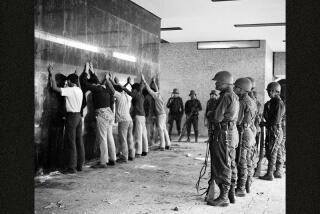Battalion’s Tale May Not Be Over Yet
- Share via
In many ways, the Atlacatl Battalion symbolized both the best and worst of the modern military in El Salvador. So it’s fitting that the elite, U.S.-trained unit was disbanded this week as a 12-year-long civil war finally winds down under the auspices of the United Nations.
The 1,100-man unit was the first and biggest of five Salvadoran army battalions trained by U.S. military advisers in modern counterinsurgency techniques. Before the Atlacatl was formed in 1981, there was serious doubt that El Salvador’s historically corrupt and brutal army could hold off its opposition, five small but tough guerrilla groups. U.S. officials hoped the Atlacatl and other new units could be victorious under a new, reformist government. They weren’t.
The civil war dragged on for a decade before a U.N.-brokered peace agreement was signed a year ago, ending a bloody stalemate that claimed almost 75,000 lives. Under that accord, the guerrillas have begun turning in their weapons and, on Tuesday, Salvadoran President Alfredo Cristiani abolished the Atlacatl Battalion.
The reasons that counterinsurgency warfare failed are likely to be debated in El Salvador, and in the United States, for years. But an assessment made last year by a key national research institute concluded that U.S. strategy foundered on “a well-intentioned but misguided assumption that techniques, technology and programs alone could transform a violent and unjust society. . . . “ Evidence now coming to light suggests that failure of modern means in the field--and, more important, perpetuation of violence and injustice--can be laid at the feet of the Atlacatl Battalion.
U.N. and Salvadoran investigators have found that at the height of combat even El Salvador’s elite, U.S.-trained troops stooped to the harsh tactics that had undercut the old army’s support among the people. Atlacatl soldiers are believed to have massacred hundreds of peasant women and children in rural Mozote in 1981. And an Atlacatl platoon was responsible for the murder of six Jesuit priests in 1989.
Both of those appalling incidents, along with others, are under investigation as part of the peace process. So it’s possible that Salvadorans have not heard the last of the now-disbanded battalion. If El Salvador’s future civilian political leaders prove to be courageous enough, there might be a final ending to the Atlacatl Battalion that matches its harsh history: trials for war crimes.
More to Read
Sign up for Essential California
The most important California stories and recommendations in your inbox every morning.
You may occasionally receive promotional content from the Los Angeles Times.













